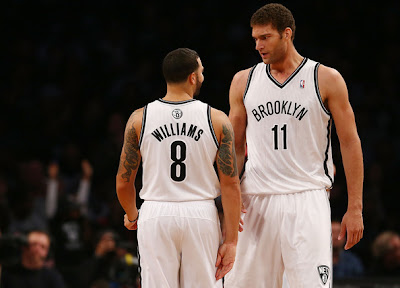Ever since it moved from Long Island, N.Y. to New Jersey in the 1970s while still a member of the ABA, the Nets franchise was just about as invisible as possible, outside of its pair of lost NBA Finals in the early 2000s.
Playing in the worst facilities in the league at the time (Brendan Byrne Arena/Continental Airlines Arena/Izod Center), the squad from New York's ugly stepsister was mostly stuck in the cellar standings-wise, attendance-wise, fanbase-wise, and just general-interest-wise.
Sure, there were those loyal diehards here and there that made the awful schlep to the hard-to-get-to Meadowlands for much of the team's 41 home games a season and watched the rest at home on TV. But, unlike with other pro sports franchises, these diehards appeared to be few and far between.
When one would make the irrational and crazy decision to go to a home Nets game during this time, especially in the latter part of last decade, he/she would notice that much of the crowd didn't seem to be too interested in the on-court action and was just looking forward to the next TV timeout for a chance at a shirt cannon t-shirt.
But now, it is different. The Nets have moved into the biggest city in the United States, specifically, into its biggest borough. Much different from playing in East Rutherford and Newark in New Jersey.
As opposed to a relative sideshow, the Nets are now a destination.
For basically its entire existence as a franchise, the Nets have not been very competitive, good, or successful. However, in just its first year in Brooklyn, the Nets are playoff-bound, have clinched a winning road record for the first time in team history, have sold out the Barclays Center multiple times, and have become a legitimate contender.
What wonders can a new arena/city/players/coach/fan-base/etc can do for a team.
 It is rare that such a transformation can be seen in a team from just one year to the next. After going just 22-44 last season, the Nets are now well above .500 and are in fourth place in the Eastern Conference. The move from cellar-dwellers to tough contender has literally been completely made in roughly one season, although the roots for it were made in years past, like the trades for Deron Williams and Gerald Wallace. These moves, of course, have worked with more recent ones (like the Joe Johnson trade) to compile an intimidating and deep roster for P.J. Carlesimo's squad.
It is rare that such a transformation can be seen in a team from just one year to the next. After going just 22-44 last season, the Nets are now well above .500 and are in fourth place in the Eastern Conference. The move from cellar-dwellers to tough contender has literally been completely made in roughly one season, although the roots for it were made in years past, like the trades for Deron Williams and Gerald Wallace. These moves, of course, have worked with more recent ones (like the Joe Johnson trade) to compile an intimidating and deep roster for P.J. Carlesimo's squad.
Credit for this cosmic shift belongs in multiple places, to multiple people living in multiple countries.
Mikhail Prokhorov, the Russian billionaire that has financed much of the New Jersey-to-Brooklyn move, is a major figurehead for the Nets' departure from NBA bottom-feeder. Billy King, the general manager who has constructed this team's roster, has shown the ability to swing many-player deals to bring star talent back to the Nets. P.J. Carlesimo, the interim coach taking over for the fired Avery Johnson, who has steadied the proverbial ship wonderfully, utilizing the team's varied talent and skill-sets as best as one in his tough situation could do.
And of course, all the players, especially Deron Williams, Brook Lopez and Joe Johnson, the Nets' three best players, who have been able to lead the way for the team through brutal slumps and enlightening streaks.
The only problem is, that the Nets are just happening to be a force in the Eastern Conference in a season which has a clear-cut favorite: the Miami Heat.
An immovable, and almost unbeatable, force so far this year, Miami is 3-0 against Brooklyn, having blown the Nets out every time the teams have faced each other. So, even if the Nets are able to advance past one, or maybe two rounds in the playoffs without matching up with Miami, there is little short of a miracle that would allow Brooklyn to surpass the Heat to reach the NBA Finals, the stage of all basketball stages.
But even if the Nets don't win a single playoff game this spring, the team's maiden Brooklyn season will still be a success for a bunch of reasons. Maybe just cause they do not play in New Jersey anymore.

